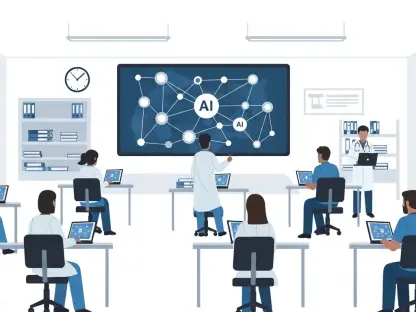Understanding the Cardiovascular Care Landscape
Cardiovascular disease remains a leading cause of mortality worldwide, placing immense pressure on global healthcare systems to deliver effective and timely interventions. With millions of individuals affected by heart-related conditions, the demand for advanced diagnostic and treatment solutions has never been higher. This critical sector drives innovation across medical technology, as healthcare providers strive to improve patient outcomes while managing rising costs and resource constraints.
The cardiovascular care industry encompasses several key segments, including diagnostic imaging, information management, and therapeutic solutions. Technological advancements such as artificial intelligence (AI) and cloud computing are reshaping these areas by enabling faster, more accurate diagnoses and streamlined clinical workflows. These tools are becoming integral to modern cardiology, offering data-driven insights that enhance decision-making and personalize patient care.
Prominent players like Philips are at the forefront of this transformation, competing alongside other industry leaders to introduce cutting-edge solutions. Regulatory approvals, particularly FDA clearance, play a pivotal role in this landscape by ensuring the safety and efficacy of new technologies. Such validations not only facilitate market entry but also build trust among healthcare professionals, reinforcing the importance of compliance in driving adoption and innovation.
Philips’ FDA 510(k) Clearance: A Technological Milestone
Innovations in the Cardiovascular Workspace
Philips’ recent FDA 510(k) clearance for its IntelliSpace Cardiovascular (ISCV) platform marks a significant step forward in cardiovascular diagnostics. Known commercially as the Cardiovascular Workspace, this solution integrates cloud-hosted availability and Software-as-a-Service (SaaS) deployment through the HealthSuite platform. This architecture allows for secure, remote access to patient data and imaging, enabling clinicians to review and analyze information from virtually any location.
Beyond accessibility, the platform leverages AI-driven analysis to automate critical tasks such as documentation and reporting. These capabilities enhance precision in diagnostics by minimizing human error and standardizing results across different care settings. Additionally, the automation of clinical workflows reduces the time spent on repetitive processes, allowing healthcare providers to focus on patient care rather than administrative burdens.
The integration with Philips’ HealthSuite platform further amplifies the solution’s impact by supporting scalability. As a cloud-based system, it can handle large datasets essential for training AI models, which in turn refine diagnostic accuracy over time. This technological synergy positions the Cardiovascular Workspace as a cornerstone for future advancements in connected healthcare.
Market Impact and Growth Potential
The strategic importance of this FDA clearance cannot be overstated for Philips, particularly in the expansive U.S. market. By validating the safety and effectiveness of the Cardiovascular Workspace, the clearance paves the way for broader adoption among hospitals and clinics seeking modern IT solutions. This milestone strengthens Philips’ competitive position, especially as healthcare providers prioritize digital transformation to improve efficiency.
Industry trends indicate substantial growth in cloud-based and AI-integrated solutions over the coming years, with projections suggesting a significant uptick in demand from 2025 to 2027. Experts highlight the scalability of such platforms as a key driver, noting that cloud infrastructure enables rapid updates and seamless integration with other systems. This adaptability is crucial for meeting evolving clinical needs and regulatory requirements.
Insights from industry leaders also underscore the potential for innovation in this space. The ability to harness large datasets for AI development is seen as a game-changer, promising not only operational improvements but also deeper clinical insights. As Philips continues to refine its offerings, the market impact of this clearance could extend beyond immediate adoption, shaping long-term strategies for cardiovascular care delivery.
Challenges in Implementing Advanced Cardiovascular Technologies
Adopting cloud and AI solutions in healthcare is not without hurdles, with data security emerging as a primary concern. Protecting sensitive patient information in a cloud environment requires robust safeguards to prevent breaches and maintain trust. Healthcare organizations must navigate these risks while complying with stringent privacy regulations, a balance that can slow implementation.
Integration with existing systems poses another challenge, as many facilities rely on legacy infrastructure that may not easily support new technologies. This compatibility issue often necessitates significant investment in upgrades or middleware solutions, adding to the financial burden. Moreover, the complexity of these systems can create a steep learning curve for staff accustomed to traditional methods.
To address these barriers, partnerships with technology giants like Amazon Web Services (AWS) offer a viable path forward. Such collaborations provide access to advanced cybersecurity frameworks and reliable cloud infrastructure, ensuring data integrity and system uptime. Additionally, targeted training programs for clinicians can bridge knowledge gaps, fostering confidence in using AI and cloud tools to enhance patient care.
Navigating the Regulatory Environment in Healthcare Technology
The FDA 510(k) clearance process serves as a critical gatekeeper in healthcare technology, validating that innovations like Philips’ Cardiovascular Workspace meet rigorous safety and effectiveness standards. This regulatory milestone assures healthcare providers that the platform is suitable for clinical use, reducing hesitation around adoption. It also sets a benchmark for quality within the industry, guiding other manufacturers in their development efforts.
Compliance with such regulations significantly influences market entry, as clearance often determines the speed at which a product can reach end-users. For Philips, this approval not only facilitates expansion in the U.S. but also enhances credibility on a global scale. Hospitals and clinics are more likely to invest in solutions backed by regulatory endorsements, viewing them as reliable components of their care delivery systems.
Furthermore, regulatory frameworks shape industry standards for emerging technologies, particularly in areas like AI and cloud computing. As these tools become more prevalent in cardiovascular care, adherence to guidelines ensures that innovation does not compromise patient safety. This dynamic creates a structured environment where companies like Philips can push boundaries while maintaining accountability to clinical and ethical standards.
The Future of Cardiovascular Care with AI and Cloud Solutions
Looking ahead, AI is poised to play an increasingly central role in cardiovascular care through predictive modeling and risk assessment. These capabilities allow for earlier identification of potential issues, enabling proactive interventions that can save lives. Personalized treatment plans, tailored to individual patient profiles using AI insights, are also on the horizon, promising a shift toward precision medicine.
Cloud infrastructure will further catalyze this evolution by supporting data-driven innovation across healthcare ecosystems. By centralizing vast amounts of information, cloud systems enable real-time collaboration among specialists, regardless of geographic barriers. This connectivity fosters a more integrated approach to care, where insights from multiple sources inform comprehensive strategies for managing heart conditions.
External factors, such as global health policies and economic conditions, will inevitably influence the pace of adoption for these technologies. Governments and payers may prioritize funding for digital health initiatives, accelerating implementation in some regions. Conversely, budget constraints or policy gaps could delay progress, underscoring the need for flexible solutions that can adapt to diverse market realities over the coming years.
Conclusion: Philips’ Role in Transforming Cardiovascular Care
Reflecting on Philips’ achievement, the FDA clearance for the Cardiovascular Workspace stands as a defining moment in enhancing accessibility and efficiency in cardiovascular diagnostics. This milestone validates a platform that streamlines clinical workflows through cloud and AI integration, ultimately benefiting patient outcomes. It positions Philips as a frontrunner in connected healthcare, demonstrating how technology can bridge gaps in care delivery.
Looking back, the collaboration with entities like AWS proved instrumental in overcoming technical challenges, setting a precedent for future partnerships. The groundwork laid by this clearance opens doors for broader clinical applications of AI, suggesting a pathway to even more transformative tools. Moving forward, stakeholders are encouraged to invest in expanding these technologies to underserved areas, ensuring equitable access to advanced care.
As the industry progresses beyond this point, a focus on strengthening regulatory frameworks and clinician education emerges as vital next steps. Addressing data security through innovative solutions remains a priority to sustain trust in digital platforms. Ultimately, Philips’ efforts signal a call to action for continued investment in scalable, intelligent systems that can redefine cardiovascular care for generations to come.









